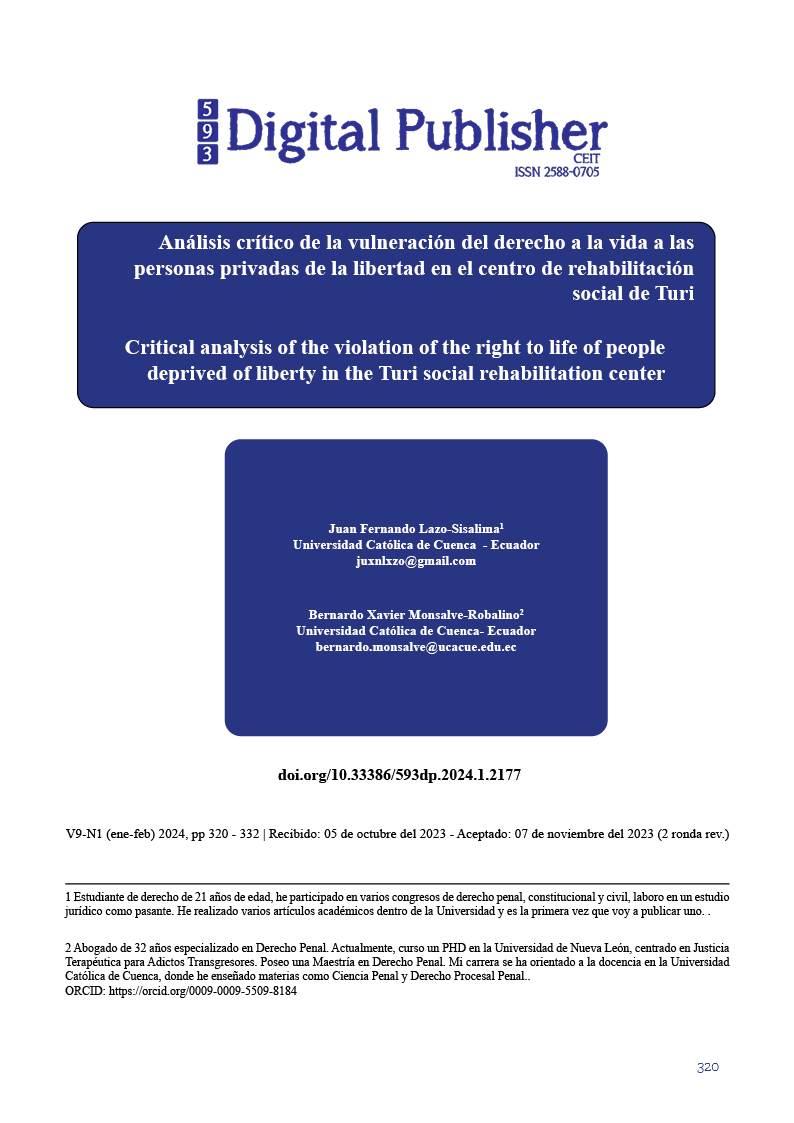Critical Analysis of the Violation of the Right to Life of People Deprived of Liberty in the Turi Social Rehabilitation Center
Main Article Content
Abstract
The situation of the disciplinary regime in Ecuador is alarming, the levels of crime and corruption have caused the institutionality of the prison system to collapse and be immersed in the worst crisis that the country has experienced in the last 25 years. The incompetence of the state authorities of the last periods of government was reflected within the rehabilitation centers where several people, including inmates, prison authorities, logistics and security personnel, have been exposed in their physical and psychological integrity or causing death. death inhumanely. Ecuador's domestic legislation, supported by ratified international treaties and conventions, guarantees fundamental rights to all people, including people deprived of their liberty in the priority care group. The State is responsible for the crisis that took place in the Turi social rehabilitation center by failing to observe constitutional and international standards of human rights, the ineffectiveness and incompetence of the government have directly affected security within the prisons and the State is the one obliged to protect this vulnerable group within society. Therefore, the violation of the right to life is determined. An inductive-deductive investigation was carried out through a systematic review of bibliographies in legal doctrine and national and international legislation that allowed us to specify its responsibility.
Downloads
Article Details

This work is licensed under a Creative Commons Attribution-NonCommercial-ShareAlike 4.0 International License.
1. Derechos de autor
Las obras que se publican en 593 Digital Publisher CEIT están sujetas a los siguientes términos:
1.1. 593 Digital Publisher CEIT, conserva los derechos patrimoniales (copyright) de las obras publicadas, favorece y permite la reutilización de las mismas bajo la licencia Licencia Creative Commons 4.0 de Reconocimiento-NoComercial-CompartirIgual 4.0, por lo cual se pueden copiar, usar, difundir, transmitir y exponer públicamente, siempre que:
1.1.a. Se cite la autoría y fuente original de su publicación (revista, editorial, URL).
1.1.b. No se usen para fines comerciales u onerosos.
1.1.c. Se mencione la existencia y especificaciones de esta licencia de uso.
References
Alarcón Vega, María Fernanda. Muso Lema, Segundo Daniel (2009). Los derechos humanos de las personas privadas de la libertad y su aplicación dentro del centro de rehabilitación social de Latacunga. Unidad Académica de Ciencias Administrativas y Humanísticas. UTC. Latacunga. 132 p.
Díaz Migrans, M. M. (2006). “La persona individual, en Valdés Díaz, CC, (coordinadora) et. al., Derecho Civil. Parte General, Primera Edición, Varela, La Habana. Editorial Félix
Diez-Picazo, L. y Gullón Ballesteros, A. (1994). Sistema de Derecho Civil, vol. I, 8va edición, Editorial Tecnos, Madrid
Constitución de la Republica del Ecuador (CRE). Registro Oficial 499, 20 de octubre del 2008, Ecuador.
Código Orgánico Integral Penal (COIP). Registro Oficial Suplemento 180, 10 de febrero del 2014, Ecuador.
Código Orgánico Administrativo (COA). Registro Oficial Suplemento 31, 7 de julio del 2027, Ecuador.
Declaración Universal de los Derechos Humanos. Asamblea General de las Naciones Unidas, 10 de diciembre de 1948.
Derechos Humanos No. 7: Control de Convencionalidad. Corte Interamericana de Derechos Humanos.
De Ángel Yágüez, R. (1995). Algunas previsiones sobre el futuro de la responsabilidad civil (con especial atención a la reparación del daño). Cuadernos Civistas.
Díaz Labrano Roberto Ruiz. El Estado de Derecho. Algunos Elementos y Condicionamientos Para su Efectiva Vigencia. chrome-extension://efaidnbmnnnibpcajpcglclefindmkaj/https://www.tprmercosur.org/es/docum/biblio/Ruiz_Diaz_Labrano_El_Estado_de_Derecho.pdf
Directrices de las Naciones Unidas para la Prevención de la Delincuencia Juvenil. Asamblea General en su resolución 45/112, de 14 de diciembre de 1990
FASSÓ. G. “Iusnaturalismo”, en Diccionario de Política, N. Bobbio, N. Mateucci y G. Pasquino (editores), 7ª ed., Madrid: Siglo XXI editores, 1991, p. 836-7.
Figueroa García-Huidobro, Rodolfo. (2008). CONCEPTO DE DERECHO A LA VIDA. Ius et Praxis, 14(1), 261-300. https://dx.doi.org/10.4067/S0718-00122008000100010
G, E. R. (2021, 2 diciembre). La muerte de 79 reos en varios amotinamientos simultáneos en diferentes cárceles reabre el debate sobre la situación penitenciaria en Ecuador. RT en Español. https://actualidad.rt.com/actualidad/384532-ecuador-situacion-carceles-muertes-amotinamientos
Galiano, G. (2016). El derecho a la vida como derecho fundamental en el marco constitucional ecuatoriano. Especial referencia al aborto, la eutanasia y la pena de muerte. Revista Jurídica Pielague.
Hervada, J. (2011). Introducción Critica al Derecho Natural. Edicione Universidad de Navarra. S.A Pamplona.
Ley Orgánica de Garantias Jurisdiccionales y Control Constitucional (LOGJCC). Registro Oficial Suplemento 52, 22 de octubre del 2009, Ecuador
Moller, M. (2007). Neoconstitucionalismo y la Teoría del Derecho. La Teoría neoconstitucionalista y su compatibilidad con el positivismo jurídico. Universidad de Burgos.
Moreno Yanes, J. (2016). A RESPONSABILIDAD EXTRACONTRACTUAL DEL ESTADO EN EL ECUADOR: LAS LIMITACIONES EN EL MARCO JURÍDICO.
Pérez Luño, A. (1994), Los derechos fundamentales, 2ª edición, Editorial Tecnos Madrid.
¿Qué son los derechos humanos? | ONU-DH. (s. f.). https://hchr.org.mx/derechos-humanos/que-son-los-derechos-humanos/#:~:text=Los%20derechos%20humanos%20son%20derechos,lengua%2C%20o%20cualquier%20otra%20condici%C3%B3n.
Sandoval, C. (s. f.). Así fue la matanza de los 34 reos de la cárcel de Turi. El Comercio. https://www.elcomercio.com/actualidad/seguridad/matanza-reos-carcel-turi-violencia.html
Sayán, D. (2011). Caso Gelman vs Uruguay. Sentencia de la Corte Interamericana de Derechos Humanos.
United Nations. (s. f.). Historia de la declaración | Naciones Unidas. https://www.un.org/es/about-us/udhr/history-of-the-declaration#:~:text=La%20Declaraci%C3%B3n%20Universal%20de%20los,de%20la%20Segunda%20Guerra%20Mundial.
Vidal, M. (1991). Moral de la persona y bioética teológica. Moral de aptitudes, II, 1a Parte, 8a edición, Madrid. Editorial Covarrubias



